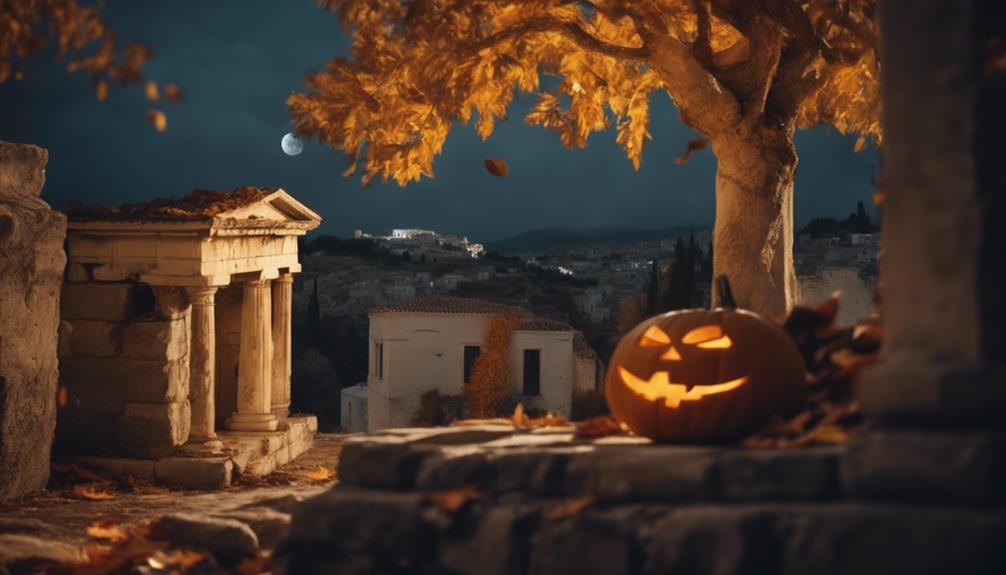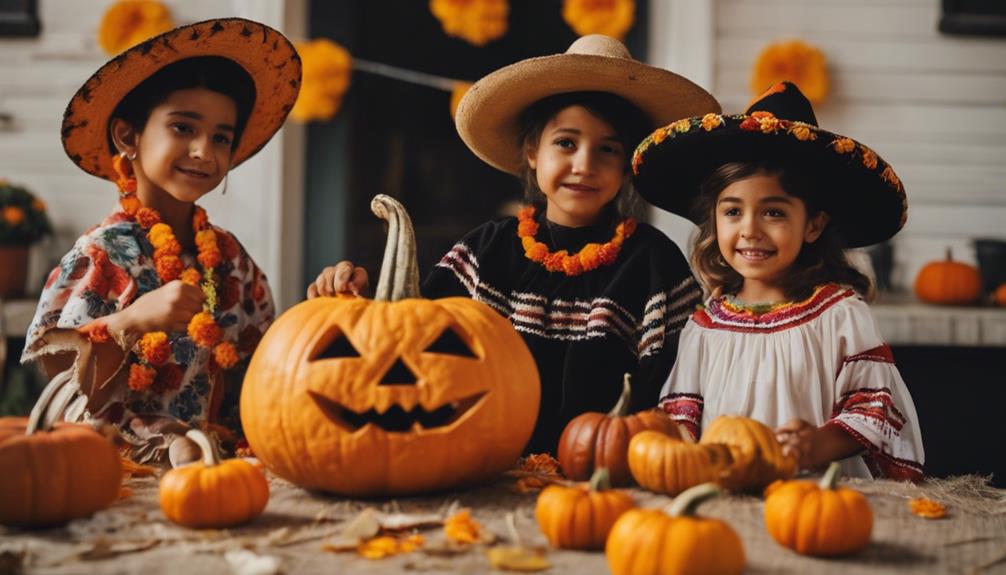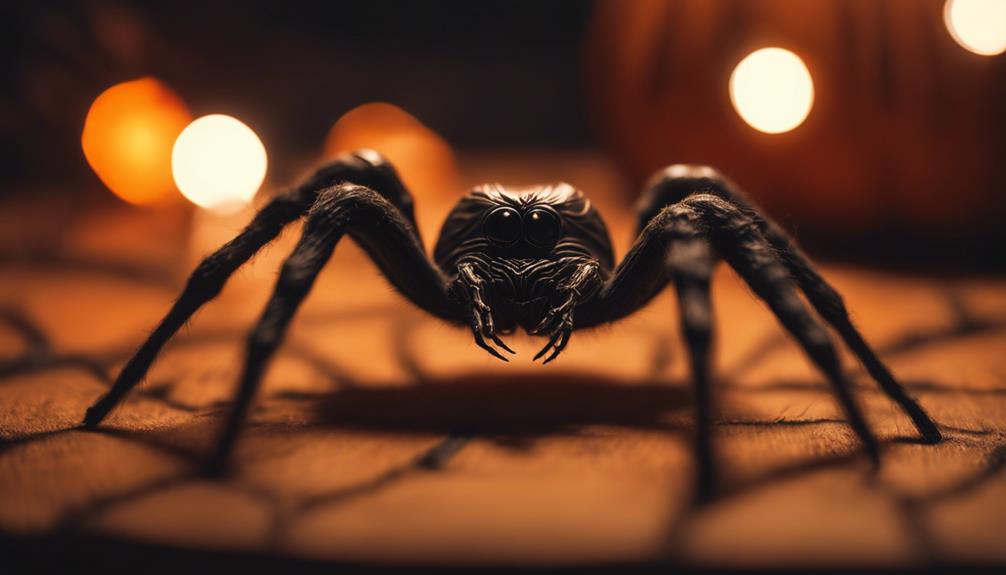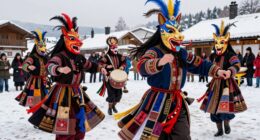You might be surprised to learn that Greece, a country rich in cultural heritage, does not widely celebrate Halloween. Instead, Greeks celebrate Apokries, a Carnival-like festival before Greek Orthodox Easter, featuring costume parties, parades, and festivities. Halloween remains a relatively unknown entity in Greece, overshadowed by Saints Day and other Christian celebrations. If you're curious about Greece's unique traditions and festivities, there's much more to explore beyond Halloween.
Key Takeaways
• Greece does not widely celebrate Halloween due to its strong cultural heritage and unique traditions.
• Instead, Greeks celebrate Apokries, a Carnival-like festival before Greek Orthodox Easter, featuring costume parties, parades, and festivities.
• Halloween remains a relatively unknown entity in Greece, where Saints Day, a Christian celebration, takes precedence.
• Greece's cultural heritage is deeply rooted in ancient customs and folklore, shaping the way Greeks celebrate or don't celebrate Halloween.
• Apokries, a vibrant celebration before Lent, is Greece's answer to Carnival, featuring colorful costumes, parades, and joyful processions.
Halloween in Greece: A Non-Event
In Greece, Halloween is largely a non-event, and you're unlikely to stumble upon spooky decorations, costume parties, or trick-or-treaters going door-to-door. This is because Greece has its own unique cultural traditions, and Halloween isn't one of them.
Instead, Greeks celebrate Apokries, a Carnival-like festival that takes place before Greek Orthodox Easter. During Apokries, people dress up in costumes and participate in parades and festivities.
The absence of Halloween celebrations in Greece can be attributed to the country's strong cultural heritage. Ancient Greek festivals and traditions have had a lasting impact on modern Greek culture, and foreign influences like the Celtic festival of Samhain (which later evolved into Halloween) haven't gained much traction.
Even Saints Day, a Christian celebration, takes precedence over Halloween. While some Greek cities might host costume parties or events, they're not widespread, and Halloween remains a relatively unknown entity in Greece.
As a result, you won't find Greeks going all out for Halloween like people do in other parts of the world.
The Origins of Halloween
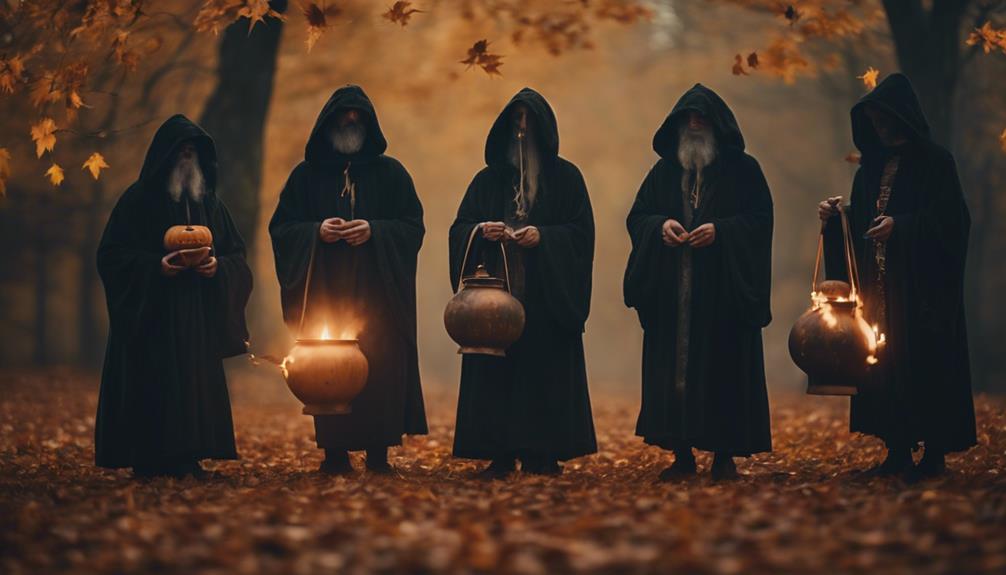
As you explore the roots of Halloween, you'll discover that this spooky celebration has a rich history that spans thousands of years.
You'll find that Halloween originated from an ancient Celtic festival, which was later influenced by pagan traditions and rituals.
Now, let's uncover the fascinating story behind this eerie holiday, starting with its Celtic roots and the impact of Christianity on Samhain.
Ancient Celtic Festival Roots
You explore the origins of Halloween by tracing it back to the ancient Celtic festival of Samhain, a pagan celebration that marked the end of the harvest season. As you investigate further, you discover that Samhain was a time when the Celts believed the boundary between the living and the dead became blurred. This ancient festival has influenced the way Greece celebrates Halloween today.
Despite Greece having its own rich cultural heritage, including Ancient Greek traditions and customs, the country has adopted many Western traditions, including Halloween. However, Greece still maintains its unique twist on the celebration, blending it with its own Apokries Carnival and Saints Day celebrations.
Samhain has shaped modern Halloween celebrations in three key ways:
- Supernatural themes: Samhain's focus on the supernatural and the afterlife has carried over to modern Halloween, with its emphasis on ghosts, goblins, and otherworldly beings.
- Seasonal significance: Samhain marked the end of the harvest season, and modern Halloween still celebrates the autumnal equinox, with its associated themes of harvest, abundance, and the cycle of life and death.
- Rituals and customs: Samhain's rituals and customs, such as divination, bonfires, and masquerade, have been adapted and incorporated into modern Halloween celebrations worldwide.
Pagan Traditions and Rituals
Greece's adoption of Halloween celebrations is rooted in the ancient pagan traditions and rituals of the Celts, whose festival of Samhain paved the way for modern-day Halloween customs.
Samhain, celebrated on November 1st, marked the end of the harvest season and the beginning of winter. This Celtic festival was believed to be a time when the boundary between the living and the dead became blurred.
To ward off any malevolent spirits, the Celts would light bonfires and wear costumes. They'd also leave food and drink offerings for their ancestors. The Roman festival of Pomona, celebrated on the same day, added elements of fruit, trees, and the harvest to the Samhain celebrations.
As you explore the origins of Halloween, you'll see how these ancient traditions and rituals have shaped the modern-day celebrations. The pagan rituals and customs of the Celts have had a lasting impact on how we celebrate Halloween today.
Christianity's Influence on Samhain
Christianity's influence on Samhain began to take shape in the 7th century when Pope Boniface IV designated November 1st as All Saints' Day, a day to honor saints and martyrs, which would eventually supplant the pagan traditions of Samhain.
As you explore the history of Halloween, you'll notice how Christian traditions blended with pagan customs. In Greece, Halloween isn't widely celebrated, but the Apokries carnival in October serves as a precursor to the spooky season. Greeks prefer to focus on their own unique traditions and customs, rather than adopting American-style Halloween celebrations.
Three key ways Christianity impacted Samhain:
- Superseding pagan rituals: Christianity sought to replace pagan traditions with Christian celebrations, like All Saints' Day and All Souls' Day.
- Incorporating pagan symbols: Christian traditions adopted and reinterpreted pagan symbols, such as the use of evergreen trees and holly to represent eternal life.
- Shaping modern Halloween: Christian influences merged with pagan customs to create the modern celebration of Halloween, which has evolved over time to include costumes, trick-or-treating, and spooky decorations.
As you dig deeper into the history of Halloween, you'll discover how Christianity's influence on Samhain continues to shape the celebration today.
Greek Celebrations and Traditions
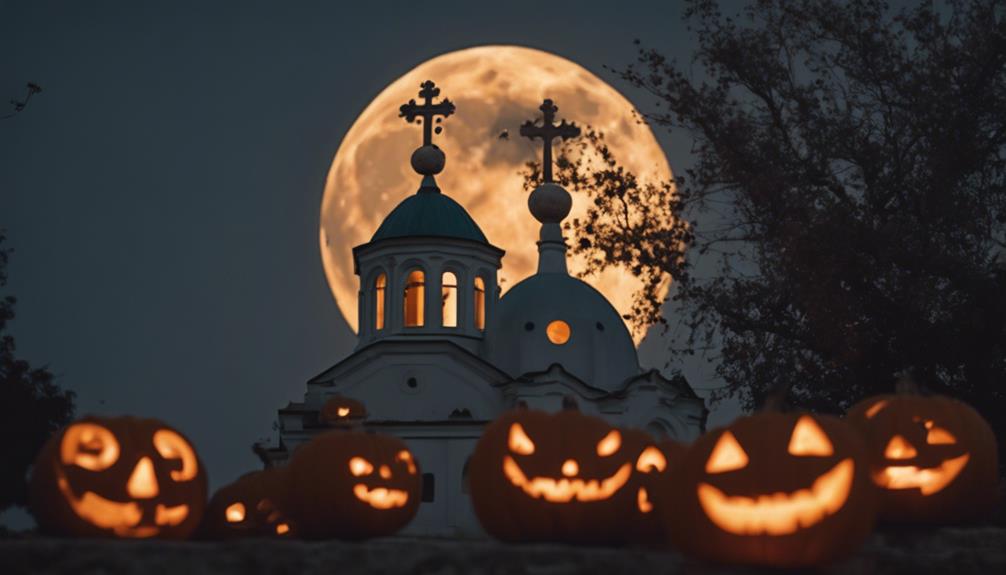
As you explore Greek celebrations and traditions, you'll discover that they're deeply rooted in ancient customs and folklore.
You'll find that modern Greek celebrations still draw from these rich cultural roots, blending old and new practices.
Now, let's examine how these ancient roots and folklore influences have shaped modern Greek celebrations of Halloween.
Ancient Roots of Halloween
You'll be surprised to learn that the ancient Greeks celebrated a festival honoring the god of the underworld, Hades, which shares eerie similarities with modern-day Halloween traditions. This ancient Greek celebration, although not directly related to Halloween, bears some striking resemblance to the spooky festivities we're familiar with today.
The festival for Hades was a time to honor the dead and the underworld. Similarly, Halloween is a time to celebrate the supernatural and the dead.
During the ancient festival, Greeks wore masks and costumes to disguise themselves as spirits. This tradition has been carried over to modern Halloween parties, where people dress up in creative costumes.
The ancient festival had a carnival-like atmosphere, with music, dancing, and feasting. This lively atmosphere is still present in modern Halloween celebrations, with parties and parades taking place around the world.
These ancient Greek traditions have, in some ways, shaped the way Greeks celebrate Halloween today, blending ancient customs with modern festivities.
Folklore and Mythology Today
In Greece, folklore and mythology continue to shape the country's rich cultural heritage, influencing various celebrations and traditions that are still observed today.
As you explore Greek culture, you'll find that many celebrations have their roots in ancient Greek traditions and mythology. Apokries, a festival similar to Halloween, is a great example of this.
During Carnival, Greeks dress up in costumes, just like they do on Halloween, to celebrate the festive season. This tradition has its roots in an ancient celebration dedicated to Dionysius, the god of wine and revelry, and features masquerade balls and costume parties.
The Greek Orthodox Church plays a significant role in shaping Greek cultural identity, and many Greek celebrations and holidays have their roots in ancient Greek traditions and mythology.
You'll also find that Greeks have a strong tradition of celebrating and honoring their dead, which is reflected in their festivals and holidays, including Psihosavata, a day to remember the dead.
Modern Greek Celebrations
Modern Greek celebrations, like Apokries, Psihosavata, and Greek Easter, showcase the country's rich cultural heritage, blending ancient traditions with Orthodox influences.
As you explore Greece's celebrations, you'll notice the significant role the Greek Orthodox Church plays in shaping the country's cultural identity. Many festivals and celebrations are rooted in Orthodox traditions, making them an integral part of Greek cultural heritage.
Apokries is a Greek festival that involves dressing up in costumes, similar to Halloween, and is celebrated just before Lent during Carnival. It has its roots in an Ancient Greek celebration dedicated to Dionysius, the Greek god of wine and revelry, and features masquerade balls and costume parties.
Greek Easter is a significant holiday in Greece, with many traditions and customs surrounding it, including the traditional Easter lamb and red-dyed eggs.
While Greece doesn't traditionally celebrate Halloween, modern-day Halloween parties are becoming increasingly popular, especially among young people, blending ancient traditions with modern influences.
These celebrations showcase Greece's ability to blend ancient traditions with modern influences, creating a unique cultural heritage that's worth exploring.
Apokries: The Greek Carnival
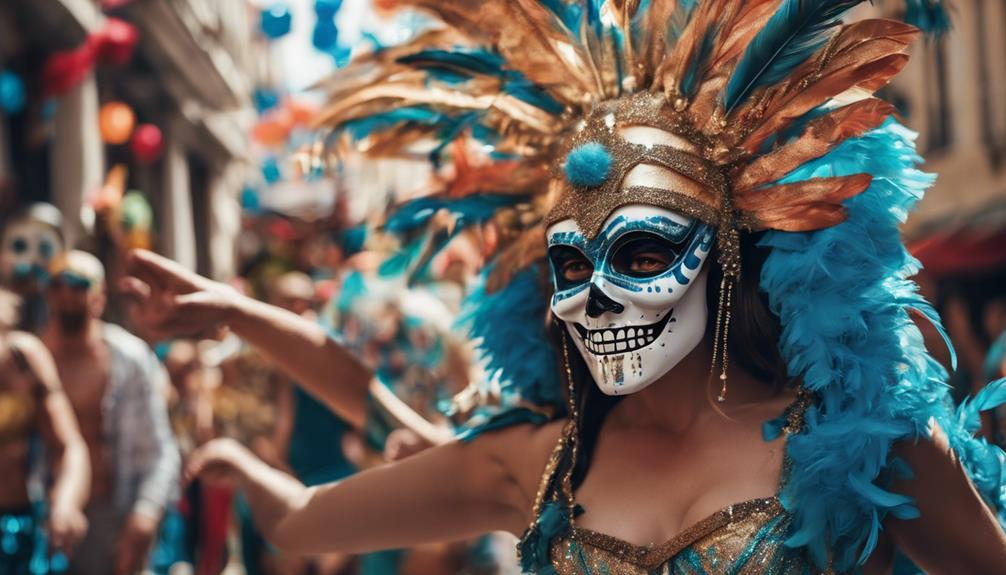
As the winter chill begins to thaw, Greece awakens to the vibrant rhythms of Apokries, the Greek Carnival, a festive season that whisks you away on a whirlwind of colorful costumes, lively parades, and joyful revelry. This festive season is a time when Greek traditions and Carnival spirit come together in a celebration that's uniquely Greek.
Apokries is a time when Greeks and expats alike come together to let loose and have fun. The festival's origins date back to ancient times, with roots in the worship of Dionysus, the god of wine and festivities. Today, Apokries is a celebration of music, dance, and masquerade, with parades, parties, and feasts taking place across the country.
| Festival | Duration | Notable Features |
|---|---|---|
| Patras Carnival | 3 weeks | Greece's largest and most famous Carnival, featuring floats, costumes, and parades |
| Xanthi Carnival | 2 weeks | Unique blend of Greek and Turkish traditions, with Ottoman-inspired costumes |
| Rethymno Carnival | 1 week | Smaller, more intimate celebration with a strong focus on community participation |
While Apokries may not be directly related to Halloween, it shares a similar spirit of revelry and celebration. As you experience the vibrant colors, lively music, and joyful atmosphere of Apokries, you'll begin to understand why Greece's Carnival season is a celebration unlike any other.
Greek Festivals and Holidays
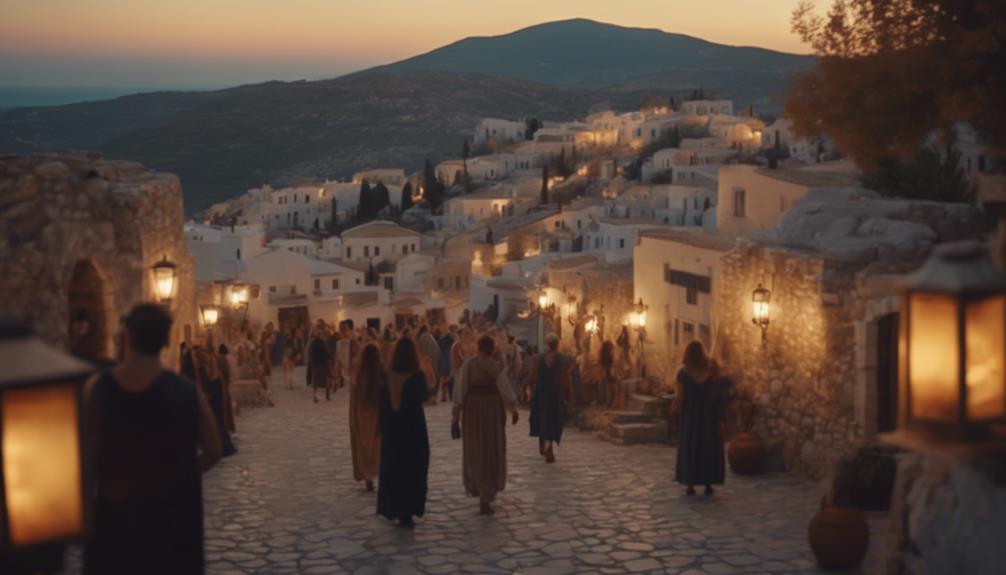
You're now immersed in a rich tapestry of Greek Festivals and Holidays, where cultural heritage and joyful celebrations intertwine, revealing the country's vibrant spirit.
As you explore further, you'll discover that Greece has a plethora of festivals and holidays that are infused with rich traditions and cultural significance.
These celebrations are an integral part of Greek life, and you'll find that they're often tied to religious traditions, mythology, and historical events. For instance, the Carnival celebrations, also known as Apokries, are a precursor to Lent, while Saints Day honors the patron saints of various regions.
Dionysius Festival: A celebration of theater, music, and dance, honoring the god of wine and revelry, Dionysius.
Carnival (Apokries): A vibrant celebration before Lent, marked by parades, costumes, and feasting.
Christmas: A festive holiday observed by Christian denominations in Greece, with traditions like decorating trees and exchanging gifts.
These festivals and holidays are an integral part of Greece's cultural fabric, showcasing the country's rich heritage and joyful spirit.
Embracing Greek Cultural Heritage
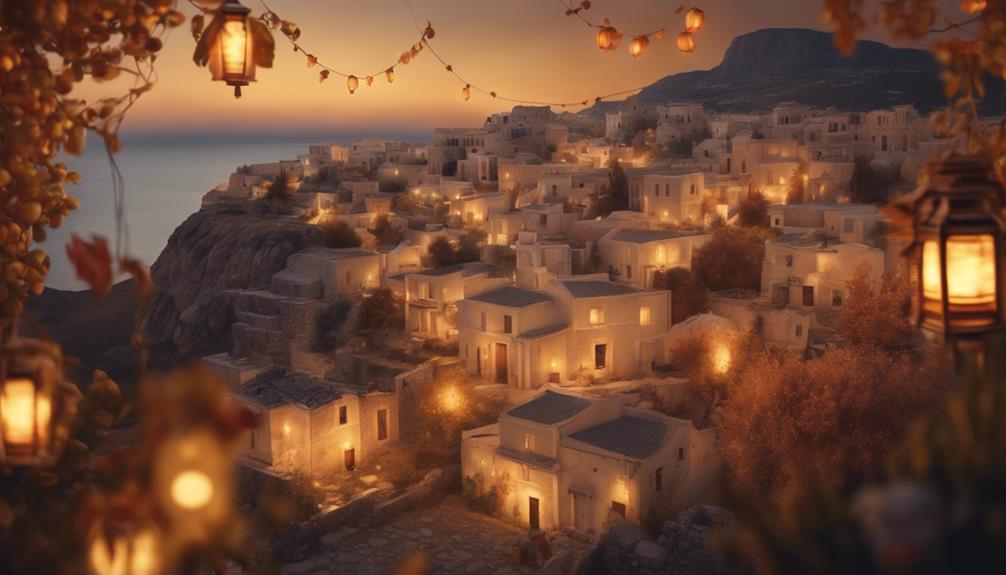
With every festival and holiday, Greece weaves a rich tapestry of cultural heritage, inviting you to immerse yourself in its vibrant traditions and joyful celebrations.
As you explore Greece's cultural landscape, you'll discover a deep-rooted connection to its heritage. While Halloween isn't traditionally celebrated in Greece, you'll find that the country's cultural heritage is woven into its unique festivals and holidays.
You might be surprised to learn that Greece has its own versions of Carnival celebrations, known as Apokries. This festive period, which takes place before Lent, is filled with colorful costumes, parades, and joyful processions.
On Saints Day, Greeks celebrate their patron saints with traditional customs and festivities. As you explore further into Greece's cultural heritage, you'll uncover a rich tapestry of traditions, customs, and celebrations that showcase the country's history and spirit.
Frequently Asked Questions
How Do People in Greece Celebrate Halloween?
Greeks don't traditionally celebrate Halloween like people in the US do.
Expats and tourists have brought Halloween parties to Greece, mainly for their own communities. These parties aren't part of Greek cultural heritage.
Greeks have their own unique festivals, like Apokries, which is similar to Halloween but takes place during Carnival season.
How Do the Greeks Celebrate?
You find yourself in the midst of a festive atmosphere, much like a kid in a candy store, when exploring how the Greeks celebrate.
In Greece, Halloween isn't traditionally celebrated, but it's gaining popularity, especially among younger generations.
You'll notice a blend of American-style Halloween parties and traditional Greek festivities, like the Patras Carnival, which features costumes, parades, and masquerade balls.
What Is the Greek Carnival Costume Holiday?
Apokries, the Greek Carnival, is a festive period that takes place ten weeks before Greek Orthodox Easter.
During Apokries, people dress up in costumes, participate in parades, masquerade balls, and other festivities, similar to Mardi Gras or Carnival celebrations.
With roots in ancient Greece, Apokries is a significant cultural event, where each town and city hosts unique festivities, including costume parties, parades, and traditional folk music and dance performances.
What Is the Greek Version of Samhain?
The Greek version of Samhain is not exactly Samhain, but Apokries, a festival with roots in ancient Greece, dedicated to Dionysius, the god of wine and revelry.
You'll find masquerade balls, costume parties, and celebration, but no trick-or-treating or supernatural themes.
Apokries marks the beginning of Carnival season in Greece, focusing on revelry and celebration, unlike Samhain's association with the dead.
Conclusion
As you explore Greece's cultural landscape, you'll find that Halloween is a whisper of a celebration, a faint echo of a tradition that's largely overlooked.
Yet, amidst the shadows of this non-event, lies a rich tapestry of Greek festivities and customs, woven from threads of Apokries, festivals, and holidays.
Embrace the vibrant hues of Greek cultural heritage, and let the rhythms of this ancient land guide you through the winding paths of tradition and celebration.
